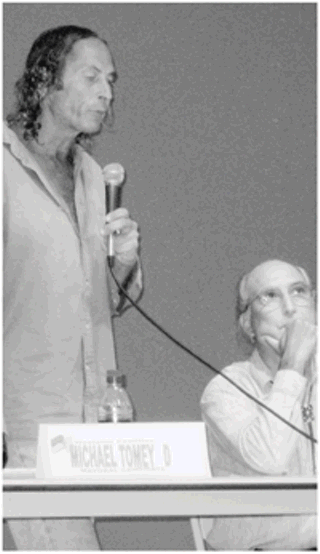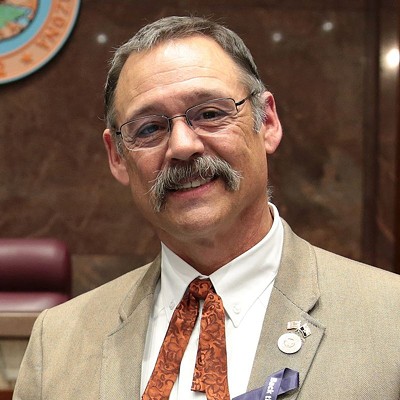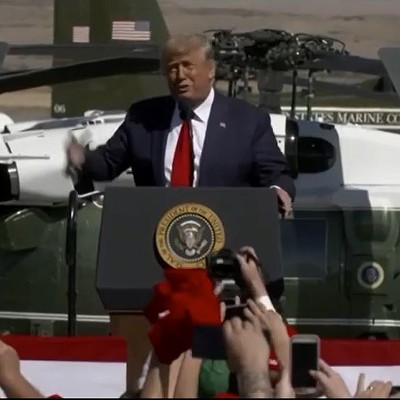1. You can ask the two candidates competing in a primary in your ward to participate in a 60-minute forum, during which voters could get a look at both of them as they debated issues 1-on-1.
2. You can invite every candidate for all of the offices--right down to the homeless guy who's trying to win the Democratic mayoral nomination through an improbable write-in campaign--to a two-hour-plus forum, and give each of them a minute or two to respond to a series of questions that barely conceal hostility toward city government.
The Westside Coalition of Neighborhoods chose the second option last week. Here's our print-delayed liveblog:
6:34 p.m. The eight candidates are asked to introduce themselves to the audience.
6:36: Green Party candidate Beryl Baker, a write-in candidate who jumped into the race to help sell the ideas of the Green Party after the Republicans didn't field a candidate in westside Ward 1, tells the audience that she helped organize her neighborhood association. "I've gone to other neighborhood meetings and helped to fight issues throughout the city," Baker tells the audience before stumbling into an awkward pause. She concludes: "I'm drawing a blank."
6:38: Democrat Ken Green, who was seeking to defeat Regina Romero in the Democratic primary in Ward 1, demonstrates his mastery of many campaign buzzwords: "I want to see some changes ... sustainable plan for water ... neighborhood safety." Green's solution? "We need to do something about it."
6:40: Romero, the odds-on favorite to beat Green in the Ward 1 race, talks about the values she learned growing up in a farm-working family, and her experience in county and city government. Her campaign platform: reinvest in the abandoned inner city, boost youth employment programs and provide more help for seniors.
6:42: Democrat Robert Reus gets to the bottom of all of Tucson's problems: "I want to return our party to the Jeffersonian roots it was founded on." Reus describes his campaign as "my gift to the voters in Ward 2."
For most of his campaign, Reus has conceded that he's going to lose the primary to Democrat Rodney Glassman (who isn't at the forum, because he's traveling), but the underdog now believes his political fortunes are on the upswing: "There's an actual possibility I could win the primary on Tuesday."
6:44: Republican Lori Oien, the Ward 2 Republican who represents the party's best hope for winning a council seat, talks about growing up in Tucson, and her work with neighborhood associations and victims of crime: "If we don't have a safe community to walk with your children and mine, then we don't have a community."
6:45: Republican Dan Spahr, a financial planner who wants to unseat three-term Ward 4 incumbent Shirley Scott (who isn't on stage tonight), is a ray of sunshine: "I have had more fun in the last five or six months than I have had in the last 30 years. I hope that maybe many of you will have opportunities to run for office and have the same joy that we're going through." Spahr points out that through "some mysterious abnormality," his name had been left off many of the event's fliers. He tells the audience how to spell his name and plugs his Web site.
6:46: Green Party mayoral hopeful Dave Croteau hasn't memorized his opening statement, so he frequently glances at his clipboard as he delivers an earnest plea for sustainability and neighborhood input "through a process known as re-localization."
6:48: Michael Toney, the homeless-shelter resident who is the closest thing to a Democrat in the mayoral race (Toney needed about 2,000 write-in votes on the primary ballot to become the Democratic Party's nominee on the November ballot), talks about his lawsuit against the city, claiming that Rio Nuevo dollars have been misused. Toney says he's familiar with council members, because he has frequently appeared before them in call-to-the-audience segments. He even tackles the vision thing: The future of Tucson involves lasers.
6:53: In response to a question about using local contractors in Rio Nuevo, Baker tries to recover from an earlier stumble: "I'm not really a polished speaker. You'll find that out." She agrees that Tucson should use local talent rather than out-of-town consultants.
7:00: Croteau suggests Tucson should abandon its pursuit of convention business, because global warming and looming environmental disasters will curtail travel to Tucson: "I'm not really big on the idea that you can build a convention center this late in the game."
7:11: Forum organizer Lillian Lopez-Grant assails two downtown organizations, the Downtown Tucson Partnership and the Tucson Pima Arts Council, as run by the "rich and powerful in Tucson." She warns: "No fat cat is going to tell us what to do." She asks candidates how they would deal with fat cats.
7:14: Green agrees that "we should not let fat cats control our destiny. ... The reason Rio Nuevo is messed up now is because of fat cats. ... I'm not for fat cats running our city."
7:18: Reus says he fought off fat cats back in Fayetteville, Ark., where he successfully changed the structure of government. He complains that City Manager Mike Hein was put into power by County Administrator "Chuck Huckelberry and the fat cats."
7:22: Croteau proposes replacing fat cats with a "neighborhood congress" that will meet once a month to advise the mayor.
7:24: Toney compares Rio Nuevo to Chernobyl.
7:41: Oien gives a shout-out to the Tucson Weekly's coverage of the Pima Cultural Plan. She calls for a tourist bed tax to fund law enforcement, not the arts.
8:08: Toney reveals that he's already offered Mayor Bob Walkup's chief of staff, Andrew Greenhill, a job in the Toney administration. "He said, 'We'll talk about it,'" Toney says.
8:12: Spahr plugs his Web site, then shares his impression of political gadfly John Kromko: "He's a very sincere fellow who desperately wants to cut taxes, but I also think he's a loon."
8:17: Baker calls the $14-a-month garbage fee "an atrocity."
8:18: Sparks fly! Oien asks for a chance to rebut Baker and takes the microphone. "I think we need to be responsible for the trash that we produce." She says the $14 fee is reasonable.
8:19: Spahr jumps in and says the loss of the $23 million a year in trash-fee dollars "is going to be hard to make up."
8:20: Croteau complains that he only puts out his trash once every three weeks, so he shouldn't have to pay as much as his neighbors.
8:43: After the candidates have all delivered their closing statements, Toney gets in the final word. He sums up the evening's theme: "Mayor Walkup has got to go."


















